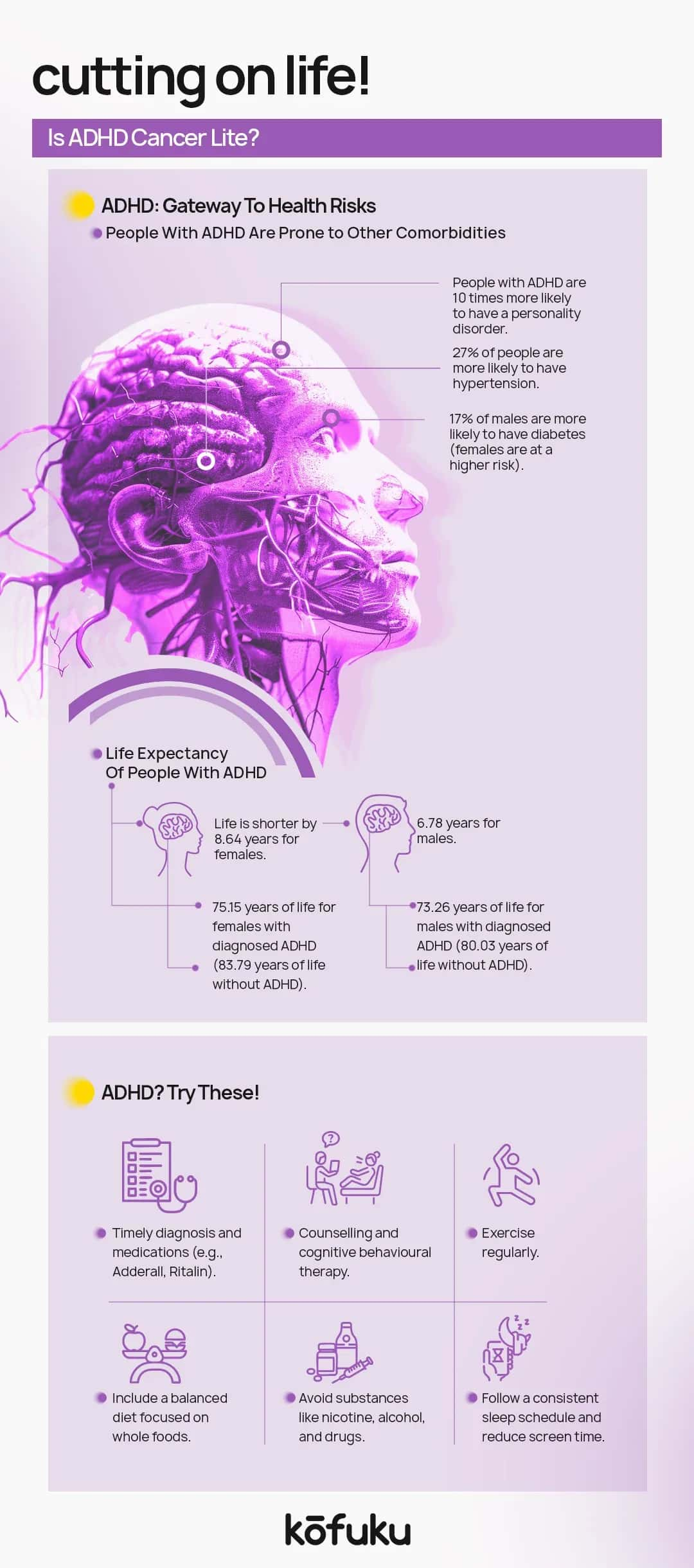The Astonishing Link Of ADHD To Reduced Life Expectancy

Introduction
Attention Deficit Hyperactivity Disorder, better known as ADHD, is a mental disorder that affects an individual's ability to focus, causing them to move around more frequently. They may also have trouble controlling their impulsive behaviours. If your introduction to ADHD was this album, you’re not alone.
However, the disorder might be a bit more common than you think. Although numbers vary very widely, there is a study that says that 10 million Indian children are diagnosed with ADHD every year.
Attention Deficit Hyperactivity Disorder (ADHD) is widely recognised as a neurodevelopmental disorder that affects focus, impulsivity, and hyperactivity. However, recent research has uncovered a startling fact: ADHD could just be linked to a much lower life expectancy.
These studies also suggest that people who are diagnosed with ADHD have a shorter lifespan compared to those without the condition. But what drives this correlation, and what can be done to mitigate these risks? In this blog, let’s explore the connection between ADHD and life expectancy, examine contributing factors, and discuss strategies to improve outcomes.
The Connection Between ADHD and Life Expectancy
Many studies have been trying to find if there’s any correlation between ADHD and life expectancy. In 2018, an issue by The Cambridge University Press and Assessment discovered that people with ADHD have a lower life expectancy of up to 13 years.
Another research study estimated that men with ADHD might live about 6.78 years less, while women with ADHD could experience a lifespan reduction of around 11 years.
This might seem a bit scary, but it is just a correlation among a relatively small sample size, not causation.
However, ADHD has always been thought of as a condition that primarily affects studies, work efficiency, and general social life. So, these discoveries make it a bit clear that the disorder also has long-term health implications beyond cognitive and behavioural symptoms.
Key Factors Contributing to Reduced Life Expectancy in ADHD Patients
ADHD does not directly shorten lifespan, but the behaviours and challenges associated with it contribute to a lot of health risks, which is what probably causes this correlation. Here are some primary factors:
Increased Risk-Taking Behaviour
People with ADHD tend to be more impulsive, leading them to do risky acts like reckless driving, substance abuse, and unprotected sexual activity. Studies show that people with ADHD are more likely to be involved in car accidents, sustain injuries, and suffer from early mortality due to preventable incidents.
Higher Rates of Substance Use and Addiction
ADHD is strongly correlated with substance use. Many people turn to alcohol, nicotine, weed, or drugs as a coping mechanism for their symptoms. This increases the risk of liver disease, cardiovascular problems, and fatal overdoses.
Smoking rates, in particular, are significantly higher among those with ADHD, which is another factor that reduces life expectancy.
Mental Health Comorbidities
ADHD rarely exists on its own. Many people with the disorder also experience conditions such as depression, anxiety, and bipolar disorder. These comorbidities not only affect daily functioning but also increase the risk of self-harm and suicide. Research has found that suicide rates are notably higher in people with ADHD compared to the general population.
Cardiovascular and Metabolic Disorders
There is growing evidence linking ADHD to an increased risk of obesity, hypertension, and diabetes. The impulsivity associated with the disorder often results in poor dietary habits, lack of exercise, and difficulty in managing chronic conditions.
Over time, these health issues contribute to a higher likelihood of heart disease and stroke, both of which can shorten life expectancy.
Poor Adherence to Medical Treatment
People with ADHD often struggle with organisation and follow-through, which means they may not consistently follow prescribed medical treatments. Whether it’s missing doctor’s appointments or just forgetting to take prescribed medications, these patterns can have long-term health consequences.
Sleep Disorders and Their Impact
Sleep disturbances are common among people with ADHD, and we all know that chronic sleep deprivation leads to a lot of health issues, including weakened immune function, obesity, and an increased risk of accidents. Over time, poor sleep quality contributes to a decline in overall health and can indirectly impact life expectancy.

How to Improve Life Expectancy for People with ADHD
The statistics and reasoning might seem a bit scary, but the good news is that these risks can be reduced with early intervention and proper management. Here are some key ways to improve outcomes for people with ADHD:
Early Diagnosis and Effective Treatment
Timely and quick diagnosis is crucial in managing any disorder, and ADHD is no different. There are many treatment options, such as medication (such as stimulants like Adderall and Ritalin), behavioural therapy, and lifestyle modifications.
A doctor or psychiatrist will usually recommend a combination of these approaches, and they have been shown to reduce impulsivity, improve focus, and decrease the likelihood of taking part in addictive behaviours.
Mental Health Support and Counselling
Given the high prevalence of comorbid mental health conditions, therapy and counselling should be an integral part of ADHD treatment.
Cognitive Behavioral Therapy (CBT) particularly has been effective in helping people develop coping mechanisms for impulsivity, emotional regulation, and anxiety management.
Promoting Healthy Lifestyle Choices
Encouraging people with ADHD, or even people who don’t have any disorder, to adopt a healthy lifestyle can significantly improve their long-term health outcomes. This includes:
-
Regular physical activity to improve cardiovascular health and mental well-being
-
A balanced diet that prioritises whole foods over processed foods
-
Avoiding substances like nicotine, alcohol, weed, or any other substance.
Improving Sleep Quality
This should honestly be higher up the list, but here are some ways to improve sleep:
-
Establishing a consistent sleep schedule
-
Reducing screen time before bedtime
-
Using relaxation techniques such as meditation or deep breathing
-
Seeking medical intervention if sleep disorders like sleep apnea are suspected
Building Strong Social and Family Support Systems
A supportive environment can make all the difference in the world. Families and friends should read about ADHD to understand what their loved one is going through.
Feeling supported can also encourage them to get some treatment and stay on track with their life without feeling alone.
Improving Adherence to Medical and Preventive Care
Because ADHD affects being organised, creating structured routines can help them stay on top of their life and healthcare needs. They can set reminders for medications and attend their health check-ups using apps for scheduling. The possibilities are limitless.

What Can Society Do?
Many kids in school are struggling with their studies without even knowing they have ADHD. So, public awareness will play a crucial role in improving the outcomes of these people while also not making them feel like outcasts.
Schools can implement ADHD-friendly learning techniques like visual cues or e-learning, while healthcare systems should provide better mental health support. Additionally, more research is needed to understand the long-term effects of ADHD and to develop targeted interventions.
Conclusion
Now you know that while ADHD doesn’t directly cause a reduced life span, it does play an indirect, albeit important, role. While the risks associated with ADHD are serious, they are not inevitable and can be stopped. By taking proactive steps, let us as a society work towards closing the life expectancy gap and improving the overall well-being of those living with ADHD.
FAQs
Why do people with ADHD die early?
ADHD is often linked to risk-taking behaviours, like driving rash, smoking and more. While having ADHD doesn’t mean you’ll die sooner, what it does mean is that having ADHD means you’ll exhibit some risk-taking behaviour that isn’t doing any favours for your life expectancy.
Why do people with ADHD have higher use of substance use and addiction?
ADHD is associated with impulsivity. A mind that’s functioning at 100 kmph. Naturally, you’d like to slow that down quite a bit. Alcohol and weed - these slow down the world and are the drug of choice for those suffering from ADHD.
What are the cardiovascular and metabolic disorders associated with ADHD?
This is a lot of evidence that links ADHD to a litany of issues like hypertension, diabetes and obesity. Because people suffering from ADHD are impulsive, it results in poor dietary habits, lack of exercise, and problems with managing chronic conditions. Over time, such health issues contribute to an increased incidence of heart disease and stroke.
Why do people with ADHD sleep less?
People with ADHD often experience issues with sleeping. This is because of
-
Hyperactivity and restlessness : One of the most common symptoms of ADHD is hyperactivity, which can make it challenging for people to relax or wind down at night. Because they’re restless, they can’t sleep.
-
Issues with routines : People with ADHD have problems establishing a consistent routine, especially for bedtime. Their circadian rhythm can get disturbed or disrupted without a consistent sleep schedule.
-
Increased Brain Activity: ADHD is associated with differences in brain function, particularly in attention and impulse control areas. This can lead to racing thoughts, which can keep someone awake longer or make falling asleep difficult.
-
Comorbid Conditions : Many individuals with ADHD also have other conditions, like anxiety or depression, which can interfere with sleep. These conditions can exacerbate sleep problems, making falling or staying asleep harder.
-
Stimulant Medications : Some medications used to treat ADHD, particularly stimulants, can cause side effects like insomnia or reduced sleep quality, especially if taken too late in the day.
-
Delayed Sleep Phase : Many people with ADHD have a delayed sleep phase, meaning they tend to stay up later and wake up later than people without ADHD. This can result in insufficient sleep if they still need to wake up early for school or work.
I have ADHD. How can I improve my sleep?
If you have ADHD and are struggling to sleep, try establishing a consistent sleep schedule and a relaxing pre-sleep routine. Don’t drink too much coffee, watch what you eat, exercise regularly, practise relaxation techniques, manage racing thoughts, and consider your medications.






